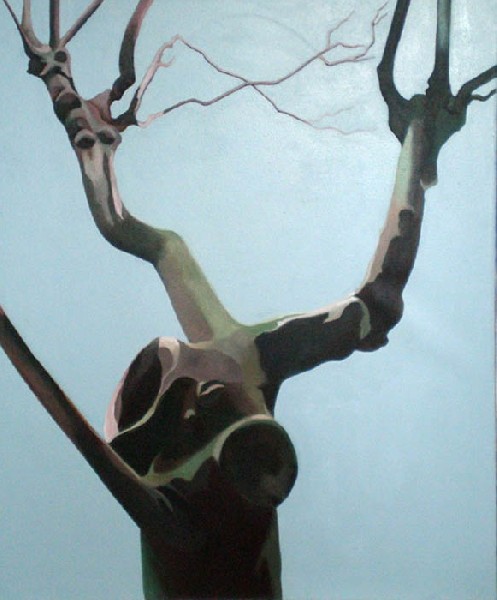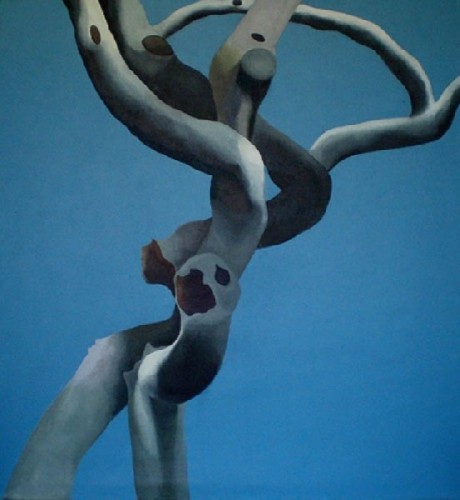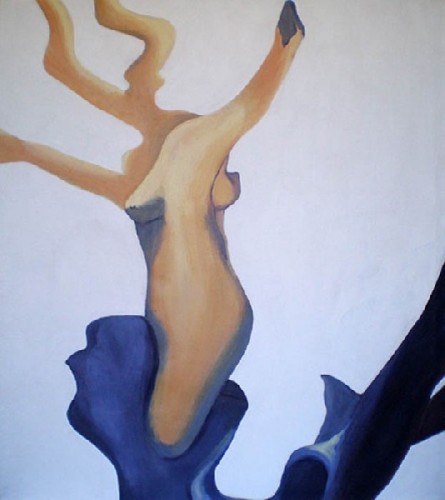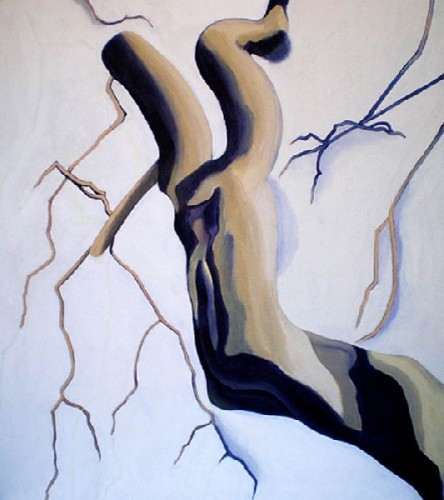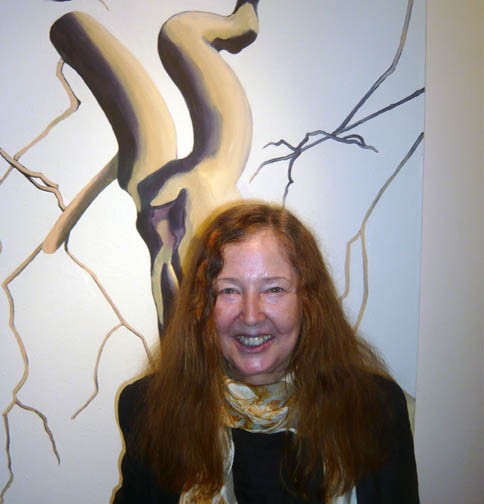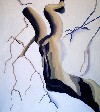Mary Hrbacek at NY’s Creon Gallery
Entwined Depicts the Forest Primeval
By: Edward Rubin - Apr 13, 2011
We all travel the Milky Way together, trees and men... trees are travelers, in the ordinary sense. They make journeys, not very extensive ones, it is true: but our own little comes and goes are only little more than tree-wavings - many of them not so much. ~ John Muir, Scribner's Monthly, November 1878
I frequently tramped eight or ten miles through the deepest snow to keep an appointment with a beech-tree, or a yellow birch, or an old acquaintance among the pines ~Henry David Thoreau
For the past decade or so, perhaps triggered by the tripling of anxiety-producing catastrophes around the world, trees of all kinds, sometimes even small forests, both realistic and obviously faux, have been making their appearance in the work of sculptors, painters, and video and installation artists. It seems more and more artists, in what appears to be an increasing back-to-nature ‘trendette’, are using trees in their work as a metaphor for examining the nature of mankind, as well as the fate of the world.
Working in this naturalist mode is artist Mary Hrbacek whose anthropomorphic portraits of trees are currently on exhibit at the Creon Gallery in New York City through April 30. Curated by Richard Pasquarelli, under the title Entwined, Hrbacek’s tree paintings are not only transcendent but speak directly to the heart, reminding us, a bit surreptitiously that we are all walking trees. Our spines are trunks, our legs and arms are branches, and sooner or later, with twisted limbs and weathered bones, we too shall be planted.
The Creon Gallery, founded in 2009 by Norm Hinsey is the perfect venue, spatially speaking, in which to closely contemplate the philosophical approach of Hrbacek’s boldly rendered paintings. There are two smallish, white-walled rooms, and a backyard garden to exhibit work outdoors, in the tiny gallery. It is housed, one could almost say, hidden, in the back of a residential apartment complex. Visitors are all but guaranteed, a pleasuring, one-on-one intimacy with the art.
Though Entwined covers a scant 4 years, Hrbacek, has been traveling the world taking photographs, and making charcoal drawings and painting of trees that have shed their leaves and exposed their so-called bones. The artist has worked in Asia and Europe, as well as Brooklyn, and New York’s Central Park, for over ten years. Her repertoire also includes assemblages which use natural materials such as sticks, stones, pinecones and leaves. She creates drawings from live models, traces of which can be divined in the artist’s sculptural brushwork — finely executed lines that give form to her tree portraits.
Each tree that Hrbacek selects to document has a particular configuration, most of whose trunks and branches resemble a part of the human body. The focus may be on the full torso, an arm, leg, thigh, woman’s breast -- or a combination of several parts. The background of each painting, adding drama by accentuating the tree’s silhouette, is an expansive sky. They are reminiscent of Monet’s various times of day paintings. Each is painted a different color. As for the color of the trees, we get a gradational mix of browns, tans, whites, and yellows, which give each tree, an eye-popping, three dimensional effect.
In Entwined (2007 - 40”x 44”), the tree’s two main branches, each one circling the other like boxers looking for an in, are vividly framed by a blue sun-drenched sky. Thinking of human relations, Hrbacek, explaining her ideas behind each work. On a listed works sheet given out at the gallery, she writes “They (the branches) are interdependent; just as so many other living things are connected and dependent on each other.” In Woman Astride (2008 – 42”x 48”), a feminine looking figure, with arms akimbo, seems to be in the throes of ecstasy. Here the painter, perhaps waxing autobiographical, sees a woman expressing “a feeling of freedom, combined with a sense of risk-taking. There is an evocation of euphoria to the female-like form as it achieves a level of freedom and independence, while remaining anchored to its natural habitation.”
In Light Search (2010- 42” x 46”) – under a pale blue sky that could be morning or dusk – two branches resembling hands, reach for the sky. They could be praying, shouting Halleluiah, or chucking it all by throwing their hands up in surrender, or like the artist suggests “searching for answers” — anything to lessen the “anxiety and the tension that arises from life itself.” In Last Dance (2007- 40” x 44”) Hrbacek captures two trees in the backwoods of Vermont. With one tree’s swaying branches encircling the other, they seem to be enacting a ritual dance.
Hanging Suspended (2008-2010 - 42” x 46”) depicts a five hundred year old Sycamore that the painter discovered in Viareggio, Italy. We see what appears to be the torso of a male with his thighs still attached dangling upside down. It recalls a tortured body from one of Jake and Dinos Chapman installations. Like all of Hrbacek’s trees, this so-called torso, separated from its leafy origin, marks it especially, as the artist writes, “as a symbol of isolation in a topsy-turvey world.” Clearly all of Hrbacek’s eleven trees on view face the same trials and tribulations – civilization gone amuck – as we all are. No doubt, this is one of the messages that the artist wants us to walk away with.
Creon Gallery
238 E 24 St
NY, NY 10010
646.265.5508
www.creongallery.com

